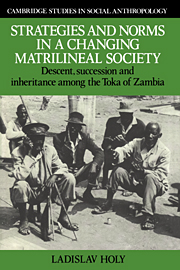 Strategies and Norms in a Changing Matrilineal Society
Strategies and Norms in a Changing Matrilineal Society Published online by Cambridge University Press: 25 August 2009
The discussion in the preceding chapters has concentrated on the description of the new way of conceptualising the mukowa and on the new norms of succession and inheritance which have emerged in Ngwezi during the past few decades. The traditional notions about descent, village ownership, succession and inheritance, described in Chapter 1, have, however, not disappeared from consciousness. They coexist alongside the newly emerged notions and are part of the cultural knowledge not only of those who advocate their continuing validity, but also of those who dispute or challenge it. In this respect, the culture of the Ngwezi Toka is less homogeneous than that of Guta and Cifokoboyo in that it encompasses two different ideologies and two different normative systems. In this chapter, I consider how these ideologies and their accompanying norms are being manipulated in the course of people's strategic behaviour.
In the discussion of the change in the inheritance system among the Ngwezi Toka, I pointed out that the norm stipulating the relationship of the successor and main heir to the deceased has been adapted to include the son, who was traditionally excluded from succeeding his father and becoming his main heir. The sister's son, however, has not been barred from his traditional prerogative of becoming the successor and main heir.
To save this book to your Kindle, first ensure no-reply@cambridge.org is added to your Approved Personal Document E-mail List under your Personal Document Settings on the Manage Your Content and Devices page of your Amazon account. Then enter the ‘name’ part of your Kindle email address below. Find out more about saving to your Kindle.
Note you can select to save to either the @free.kindle.com or @kindle.com variations. ‘@free.kindle.com’ emails are free but can only be saved to your device when it is connected to wi-fi. ‘@kindle.com’ emails can be delivered even when you are not connected to wi-fi, but note that service fees apply.
Find out more about the Kindle Personal Document Service.
To save content items to your account, please confirm that you agree to abide by our usage policies. If this is the first time you use this feature, you will be asked to authorise Cambridge Core to connect with your account. Find out more about saving content to Dropbox.
To save content items to your account, please confirm that you agree to abide by our usage policies. If this is the first time you use this feature, you will be asked to authorise Cambridge Core to connect with your account. Find out more about saving content to Google Drive.